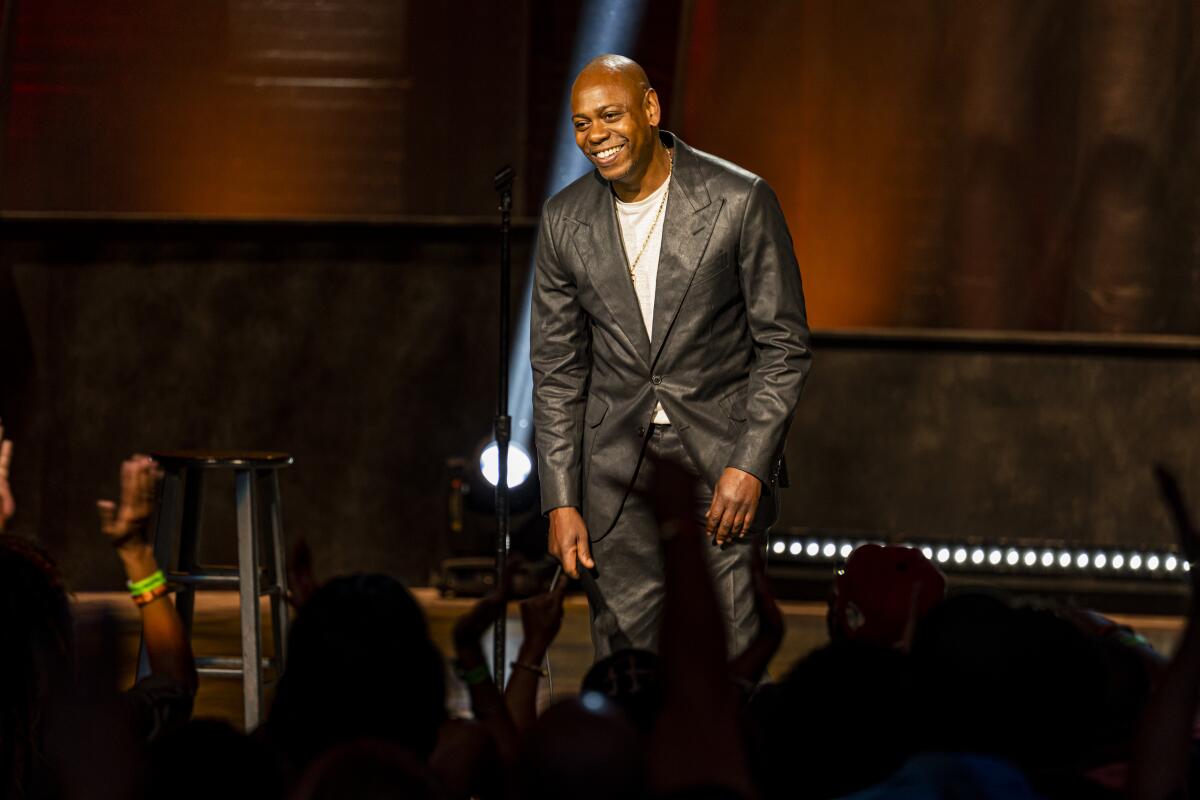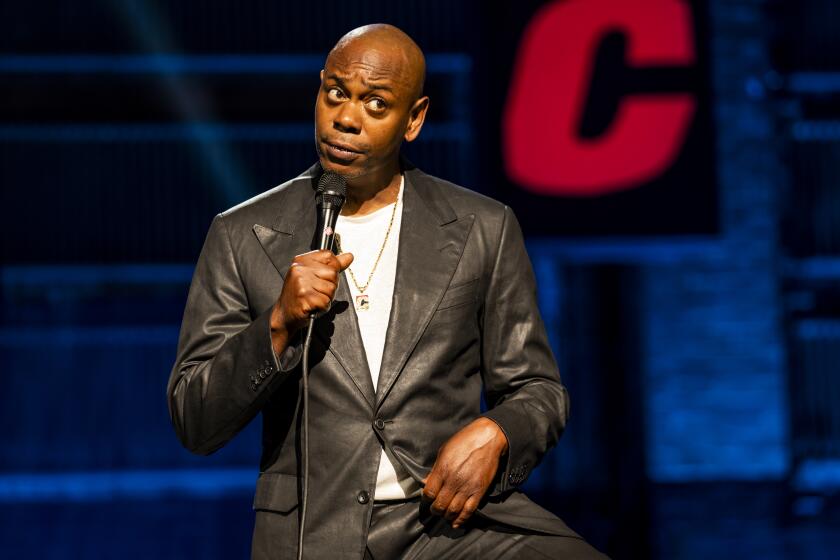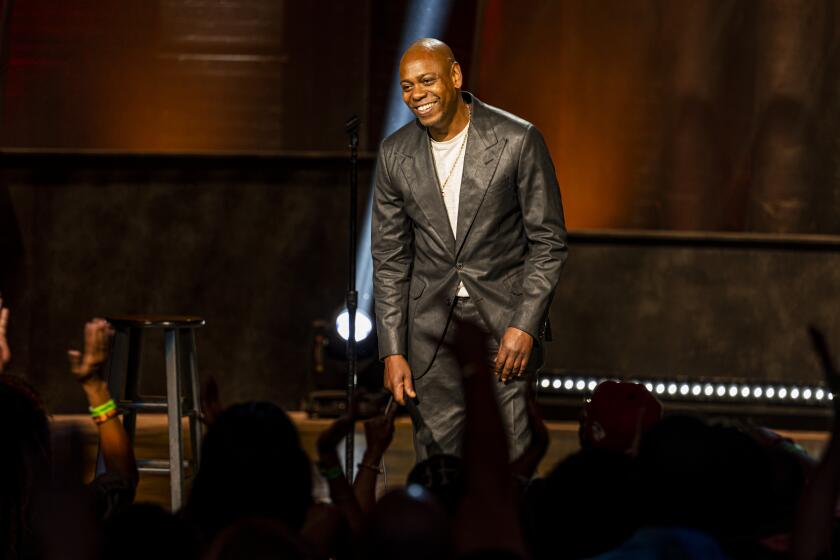Op-Ed: ‘Cancel culture’ has always been a problem for comedy

- Share via
Is freedom of speech evaporating from the world of comedy? We hear a familiar mantra whenever someone like Dave Chappelle comes under fire: You can’t joke about anything anymore. PC police. Cancel culture. People are too sensitive. But does this premise hold up to scrutiny? Studying history, it seems clear comedians have more freedom of speech today, not less.
At the start of the 20th century, ethnic minorities objected to the way they were portrayed onstage. Instead of airing grievances on the yet-to-be-invented internet, many delivered their objections in person.
Irish and Italian immigrants were vocal at the turn of the century. Vaudeville comic Walter Kelly received “a letter threatening his life if he did not immediately cut out several Italian stories in his act,” and an Irish betterment organization called the Clan na Gael pelted comedians with eggs for perceived slights against the Irish.
A newspaper editorial in Kansas feared this would inspire other groups to do the same: “If the well-known and almost indispensable Irish policeman is to be abolished from the stage by decree of the Clan-na-gael, what is to hinder the ‘Afro-American’ societies from following suit and threatening dire consequences on the heads of players who represent the stage type of negro?”
Chappelle has painfully glaring blind spots when it comes to intersectionality. Yes, you can be Black and queer at the same time.
That’s precisely what happened. African Americans, Native Americans and American Jews all staged protests in the early 20th century. In 1903, the Topeka Capital predicted the death of comedy: “The final upshot [of protest is] to strip comedy of its most engaging and popular features. If the raid should extend to all sorts of people caricatured in the theater and in print, then good-bye to comedy.”
Indeed, jokes concerning politics, religion and sex were taboo for most of the century. Even the most casual carnal reference could result in arrest. The legendary Mae West wrote a number of popular stage comedies, and for her efforts she was convicted of obscenity in 1927 — and sentenced to 10 days in a prison workhouse.
The debate concerning stereotypes was especially fierce when the television became a household appliance in the 1950s. TV executive Bob Wood explained why CBS and NBC were purging stereotypes from programming in 1956: “We deleted any material which we consider derogatory to any minority group — that’s on a common sense and public relations basis.”
Three L.A. comics discuss whether Chappelle’s jokes were punching down or just needed some punching up.
The Wilmington Morning News sounded the death knell: “There isn’t much laughter any more — because there’s no way to speak in any light fashion about any group of people anywhere.”
Some comedians intentionally provoked their detractors out of spite. “From now on I’m going to use as much dialect material as possible in my guest appearances,” said comedian Danny Thomas, claiming he was sick of “over-sensitive groups” that were “too thin-skinned.”
Comedians resented interference — yet if it meant advancing their career, they went along with it. “The Tonight Show” was created in 1954 and became an important stand-up showcase. For seven decades, comedians have willingly eliminated the F-word without screaming about censorship or accusing hosts such as Johnny Carson of tyranny.
Members of the LGBTQ+ community were not pleased with comedian Dave Chappelle co-signing J.K. Rowling’s transphobic remarks in his new Netflix special.
The obscenity laws used to prosecute Mae West and Lenny Bruce were deemed unconstitutional in the late 1960s, chipped away by the courts. Freedom of expression flourished as obscenity laws were overturned at the start of the ’70s.
But police didn’t always abide by the new standard. “Blazing Saddles,” a Mel Brooks film released in 1974, was co-written by Richard Pryor. While it was playing in theaters, Pryor was arrested in Richmond, Va., for using the same language onstage one could hear in the film. His manager was told a warrant had been issued for “disorderly conduct.” Pryor turned himself in and was released after posting a $500 bond.
In the same decade, Sears pulled its sponsorship of “Three’s Company” due to religious pressure, George Carlin was arrested after cussing and “Welcome Back, Kotter” was banned in Boston over fears it would trigger disorder. In the 1980s, comedy team Bowley and Wilson were arrested for flatulence humor. In the 1990s, Andrew Dice Clay canceled a show fearing he’d be arrested on an obscenity charge in Texas. All of this occurred long before the words and phrases “millennial,” “safe space” or “retweet” came along.
Comedians have far more freedom today. Subject matter involving sex, religion, politics or profanity does not result in jail time. The tug of war between censorship and free speech has been part of comedy for its entire existence. It is likely to continue.
Kliph Nesteroff is the author of “The Comedians: Drunks, Thieves, Scoundrels and the History of American Comedy.”
More to Read
A cure for the common opinion
Get thought-provoking perspectives with our weekly newsletter.
You may occasionally receive promotional content from the Los Angeles Times.












